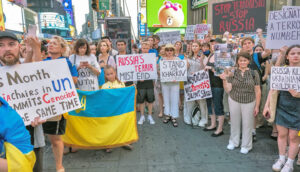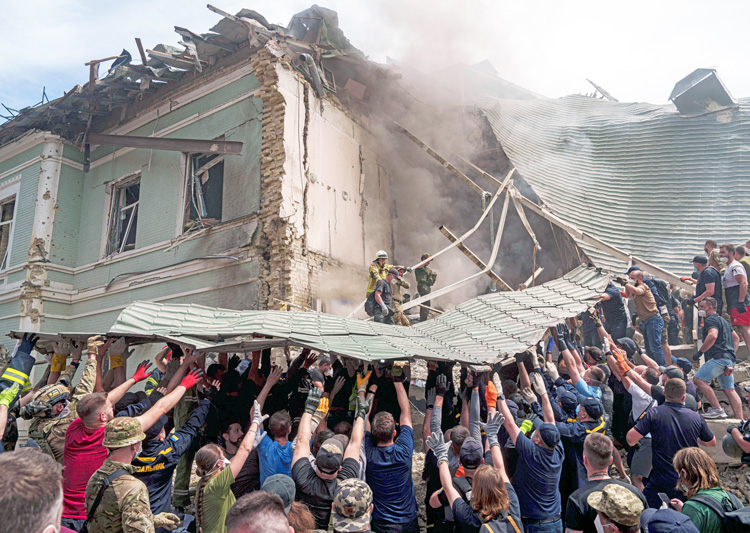When Russian President Vladimir Putin launched his invasion in 2022, he minced no words in explaining Ukraine is not really a nation at all and has no right to be one. “Modern Ukraine was entirely and fully created by Russia,” he said. It is “an inalienable part of our own history, culture and spiritual space.” And he has conducted the war along these lines, with attacks aimed at causing the most deaths and destruction in Ukraine’s civilian-occupied urban centers.
His goal is to crush the determination of Ukraine’s people to fight for their independence. Following this course, Moscow’s war has brought armed conflict to Europe on a scale not seen since World War II, raining death, destruction and dislocation on millions of Ukrainian working people.
Putin’s strategy relies on the Russian Federation’s larger population and reserves, and his willingness to sacrifice them at unprecedented rates as cannon fodder. And he counts on exploiting the increasingly conflicting interests among Kyiv’s allies, starting with Washington.
Moscow scored a direct hit on Ukraine’s main children’s cancer hospital in Kyiv July 8, using a cruise missile, killing seven people and injuring dozens. This was part of aerial strikes on urban areas across the country killing at least 43 people and injuring almost 200.
“There may still be children, parents and medical personnel trapped under the rubble,” a statement released that day by the Confederation of Free Trade Unions of Ukraine said. The union appealed for greater international support “as Russia continues its terrorist attacks and genocidal war in Ukraine.”
May was the deadliest month for civilians in Ukraine over the past year, the U.N. Human Rights Monitoring Mission in Ukraine said. At least 174 civilians were killed and 690 injured.
Moscow is also targeting Ukraine’s power grid and other essential infrastructure, seeking to increase civilian misery. This has destroyed almost half the country’s energy-generating capacity, which will take some time to repair. Water supplies, public communications and transport have also been disrupted. With daily blackouts, millions face a harsh upcoming winter without heating and other services needed for survival.
Defying Moscow, life goes on
The people of Ukraine are not only unbowed, defiant and determined to prevail, but they also find ways to enjoy life in spite of the war.
Kyiv’s International Arsenal Book Festival drew 35,000 visitors May 30-June 2, held in a 19th-century arsenal in the center of the capital. Held annually since 2011, it featured over 160 book presentations and a musical tribute to Ukrainian writers who have been killed by Moscow’s aggression.
Soldiers from various brigades at the front, and writers volunteering to defend the country arms in hand did presentations and staffed booths. The turnout was overwhelmingly young people who had to wait in long lines to get through security checks.
One stand displayed burned books salvaged after a May 23 attack on a Kharkiv printing plant, one of the country’s largest. Russian missiles killed seven workers and destroyed 50,000 books. Moscow wages war not only against the Ukrainian people, but against the Ukrainian culture and language.
In Kharkiv, Ukraine’s second city, located 18 miles south of the Russian border where a new invading force was repulsed in May, life goes on despite the war. A street wedding celebration was held in between air raid sirens. Just beyond the range of enemy artillery, actors rehearsed their lines in the Kharkiv Opera House while people enjoyed an afternoon concert in a windowless basement theater. All underground facilities now double as bomb shelters.
“Kharkiv is going to stand,” theater director Armen Kaloyan told the Washington Post. “We’re unbreakable. We’re going to fight with what we’re good at.”
Moscow’s bombardment of populated areas has gone on throughout the war. The civilian toll is rising as Moscow uses more powerful glide bombs that cause significant damage. These are Soviet-era heavy munitions fitted with guidance systems that enable them to be launched from Russian air space, out of range of Ukrainian air defenses.
The recent U.N. report also cited a number of instances of deliberate “double-tap” attacks, which target the same location. The first missile hit on a civilian target attracts volunteer rescue personnel and emergency workers, who are then hit with the second missile.
During the Second World War, the main allied imperialist powers, the U.S. and U.K., set a precedent for Putin, targeting civilian populations in Germany and Japan. Working-class neighborhoods in German cities like Dresden and Hamburg were carpet bombed, setting off firestorms that killed tens of thousands. U.S. bombers did the same to Tokyo, not to mention the atomic bombing of Hiroshima and Nagasaki.
Opposition at home to Moscow’s war
For months, the strategy of Moscow’s officer corps has been to press relentlessly against Ukraine’s defenders, paying a high price in soldiers’ lives for small advances. Around 1,200 Russian soldiers were killed or wounded every day in May and June. They were sent in human waves in what Ukrainian troops call “meat assaults.”

Despite the narrowing space available given the Russian regime’s tightening repression, opponents of Moscow’s war keep making use of Russian elections, which the Kremlin preserves to claim legitimacy. Lyudmila Vasilyeva, 83, ran for mayor of St. Petersburg demanding that “the war stop immediately.” She has used her status as a survivor of the German imperialist siege of Leningrad during World War II to protest Putin’s wars in Ukraine from 2014 to today.
Her campaign for the election in September drew in youthful supporters from the Dawn party, founded earlier this year by fellow anti-war campaigner Yekaterina Duntsova, who was barred from running in the March presidential election.
Some 6,800 voters, braving the Kremlin’s police pressure, came to Vasilyeva’s campaign headquarters to sign to endorse her anti-war candidacy. She was ruled off the ballot at the end of June but vowed to keep fighting. People expressed gratitude to her for giving them the “opportunity to show that not everyone in Russia supports the war,” Vasilyeva said.


